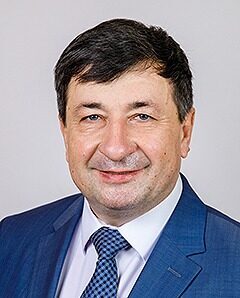| Material and technical support |
Provision with training premises, computer workplaces and multimedia
equipment meet requirements. All required social and domestic infrastructure is available, the number of places in hostels meets requirements. The University has the academic and research complex “University Clinic”, the Research Institute of Occupational Hygiene and Occupational Diseases, the University Stomatological Centre, the Centre of Preclinical and Clinical Researches, the Centre of Gender Education, 4 fundamental research laboratories, the Anatomical Museum, the Vivarium, the Testing Centre, study rooms for simulation training (phantoms), the Central Research Laboratory of the University, the Scientific Training Institute for International Students, the Scientific Training Institute of Education Quality, 6 education-research-production units. KhNMU has 32 local computer networks and 55 Wi-Fi access points. Using of Internet is unlimited. |
| Information and methodological support |
KhNMU has its official site http://www.knmu.kharkov.ua; its Scientific Library has the complete set of academic books in all course units (in the state, Russian and English languages). The web site of the Scientific Library http://libr.knmu.edu.ua provides a convenient remote access to various information resources; its electronic catalogue contains over 210,000 bibliographic descriptions including more than 2,200 references to full texts (textbooks, learning and teaching literature, materials of congresses and conferences, periodicals, etc.). The University has created and continuously enriches problem-oriented databases in the basic areas of its researches – “The Health of the Healthy”, “Minimally Invasive Interventions”, “Cardiovascular Diseases”, “Viral Bacterial Infections” – as well as in such challenging subjects as “Evidence-Based Medicine”, “Military Medicine” and “Ailments of the “Great Names of History”” (the full texts). The Repository of KhNMU is the first one among higher medical schools of Ukraine with a free access to learning, teaching and scientific materials; it numbers over 12,000 full text documents, including 1,300 learning, teaching and lecture materials. The inclusion of learning, teaching and lecture materials, rather than only scientific ones, into the Repository enables the students to study independently in the 24/7 mode. Databases, first of all of the biomedical specialization, include Medline, Cochrane Library, Academic Search Premier, Health Sourse, PubMed, DOAJ, Open J-Gate, BioOne, etc. By the programme of the project “Electronic Information for Libraries” (eIFL Direct) we are provided with free trial accesses to scientometrical databases Web of Science from Thomson Reuters publishing house, resources of East View Information Services, JSTOR Consortium of different foreign publishing houses, such as Royal Society Publishing, Nature, Academic Press, Springer International Publishing AG, Institute of Physics Publishing (IOP Publishing) as well as to electronic versions of journals The New England Journal of Medicine, Pediatric Neurology Briefs, to journals and books of Elsevier, resources of Ovid Company – “Primal Interactive Human: the 3D Real-time Body” (multimedia interactive 3D human anatomy), Reactions Pharmacovigilance Insight, APA PsycINFO™, PsycTESTS, etc.; there is a web indicator of medical journals having interactive electronic links with electronic archives. All reading halls and those of electronic information work in the Wi-Fi area and provide a free access to Internet. |

